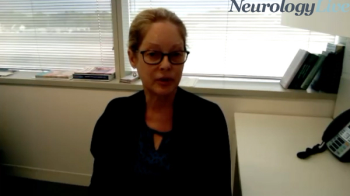
The molecular biologist at the Cleveland Clinic Lerner Research Institute provided commentary on how certain activity markers may help understand immune response differences in Alzheimer disease and related dementias.

The molecular biologist at the Cleveland Clinic Lerner Research Institute provided commentary on how certain activity markers may help understand immune response differences in Alzheimer disease and related dementias.

The chair of the nephrology division at Mayo Clinic provided context on recent findings linking inflammation and neurovascular damage in women with a history of severe preeclampsia, and how the community may react. [WATCH TIME: 2 minutes]

The associate professor of neuropsychology at the University of Miami Miller School of Medicine discussed the next steps in using the Cognitive Stress Test and the remaining questions from recent findings. [WATCH TIME: 4 minutes]

The director of the Women’s Alzheimer’s Movement Preventer Center at Cleveland Clinic provided perspective on the possibility of gender-specific therapies to overcome disparities in Alzheimer disease. [WATCH TIME: 3 minutes]

The molecular biologist at the Cleveland Clinic Lerner Research Institute discussed research on the use of GFAP and sTREM2 in discerning dementia with Lewy bodies from Alzheimer disease. [WATCH TIME: 4 minutes]

The director of the Women’s Alzheimer’s Movement Prevention Center at Cleveland Clinic discussed new research which looked at the differences in functional connectivity for men and women of older age.

The chief medical officer and cofounder of Linus Health discussed how changes in voice may help serve as early indicators for late-life cognitive deficits. [WATCH TIME: 3 minutes]

Vesna Garovic, MD, PhD, chair of the nephrology division at Mayo Clinic, discussed the appropriate reaction to data suggesting late-life elevated inflammation and neurovascular damage from severe preeclampsia.

The associate professor of neuropsychology at the University of Miami Miller School of Medicine provided insight on how persistent impairments seen on a cognitive screening tool may differentiate cognitive status. [WATCH TIME: 6 minutes]

The chair of the nephrology division at Mayo Clinic discussed the major questions surrounding preeclampsia and its long-term effects, as well as whether new findings change the way clinicians treat patients with the condition. [WATCH TIME: 4 minutes]

The chief medical officer and cofounder of Linus Health provided insight on the outlook of acoustic measures and machine learning to further classify cognitive impairment. [WATCH TIME: 4 minutes]

Jagan A. Pillai, MD, PhD, neurologist, Cleveland Clinic Lou Ruvo Center for Brain Health, discussed a recent study which found faster clinical progression in those with nonamnestic initial cognitive symptoms.

Effect modification by cognitive status and APOE genotype revealed greater effects of mild behavioral impairment with apathy in those who had normal cognition or in non-APOE ɛ4 groups.

The nephrologist at Mayo Clinic provided insight on new data showing elevated extracellular vesicles of neurovascular origin in women with a history of severe preeclampsia years after pregnancy. [WATCH TIME: 4 minutes]

The neurologist at Cleveland Clinic’s Lou Ruvo Center for Brain Health detailed new findings on whether initial cognitive symptoms have similar rates of functional decline across a handful of neurodegenerative disorders. [WATCH TIME: 3 minutes]

In addition to significant associations between executive memory and cognition, baseline neurofilament light levels and age trended toward significance.

The chief medical officer and cofounder of Linus Health provided background on the reasoning for the measures used in a new machine learning algorithm that classifies cognitive status. [WATCH TIME: 3 minutes]

During a Focused Topic Session at the 2022 Alzheimer’s Association International Conference, NeurologyLive® inquired with a panel of experts about the possibility of exploring a combination approach to Alzheimer disease as the future of treatment.

All severities of Alzheimer disease showed statistically significant benefits from the exercise program relative to controls, with more mild groups demonstrating the most improvement.

The monoclonal antibody that preferentially targets Aß oligomers failed to meet either of its coprimary end points—despite favorable results over the placebo group—in individuals who were unimpaired but at risk for AD.

Using several large-scale cohorts, findings showed that cumulative incidence of Alzheimer disease grows faster with age in R145C variant carriers compared with noncarriers, contradicting prior research results.

The medical director of the Deanna and Sidney Wolk Center for Memory Health provided background on his new study using multimodal digital biomarkers to classify patients with mild cognitive impairment. [WATCH TIME: 5 minutes]

Across the cohort, 11.6% of patients had impairments in memory, attention, and executive function; however, cognitive status was influenced by severity of anosmia, or loss of taste and smell.

Non-White participants over 90 years of age who reported a mean of 4 discrimination experiences had significantly worse baseline semantic memory compared with those who reported little/no discrimination.

A cohort of more than 2000 older Latin American individuals reported a significant difference in cognitive symptoms when they underwent a positive life change during the early phase of the COVID-19 pandemic.

As hospitalizations remain high throughout the COVID-19 pandemic, new data suggests that ICU hospitalization is associated with increased risk of Alzheimer disease and all-type dementia.

Test your neurology knowledge with NeurologyLive®'s weekly quiz series, featuring questions on a variety of clinical and historical neurology topics. This week's topic is the history of the Alzheimer's Association.

After 26 weeks of treatment, those on fosgonimeton alone without acetylcholinesterase inhibitors showed a potentially beneficial change in event-related potential P300 latency, an outcome of working memory processing speed.

In addition to his work study pimavanserin in treating dementia-related psychosis, the director of the Banner Alzheimer’s Institute commented on the potential for aducanumab in Alzheimer disease.

The director of Banner Alzheimer’s Institute spoke on the importance of biomarkers in Alzheimer disease, as well as the ongoing improvements in digital technologies.